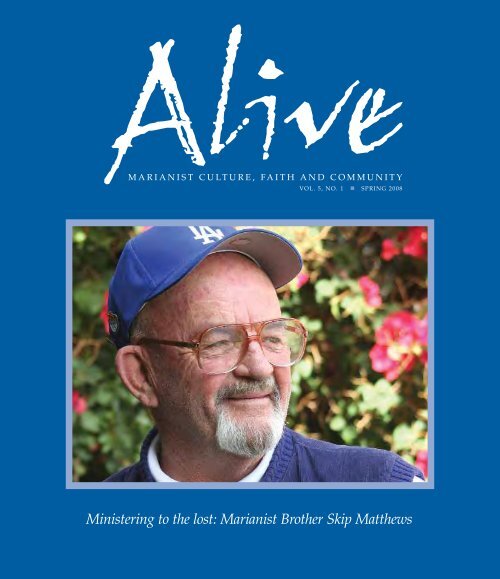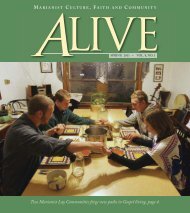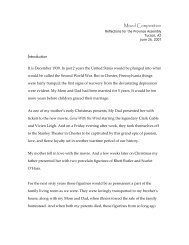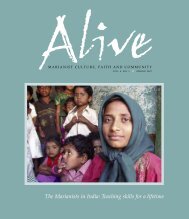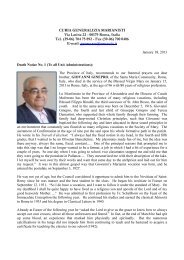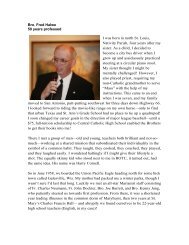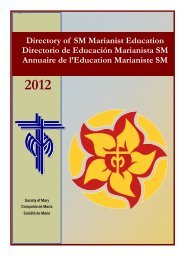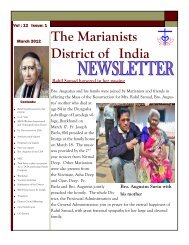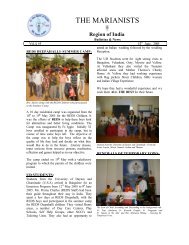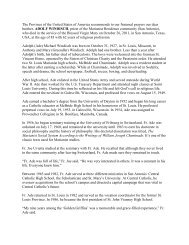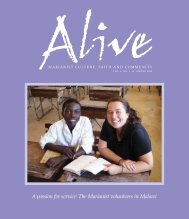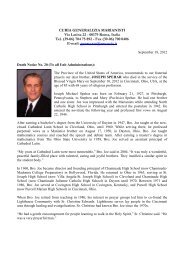Marianist Brother Skip Matthews - The Marianists
Marianist Brother Skip Matthews - The Marianists
Marianist Brother Skip Matthews - The Marianists
You also want an ePaper? Increase the reach of your titles
YUMPU automatically turns print PDFs into web optimized ePapers that Google loves.
Alive<br />
MARIANIST CULTURE, FAITH AND COMMUNITY<br />
VOL. 5, NO. 1 ■ SPRING 2008<br />
Ministering to the lost: <strong>Marianist</strong> <strong>Brother</strong> <strong>Skip</strong> <strong>Matthews</strong>
<strong>Brother</strong> Stephen Glodek<br />
A MESSAGE FROM THE P ROVINCIAL<br />
My Dear Friends,<br />
Greetings and blessings to you from St. Louis! On behalf of the Province community, I again<br />
offer you our heartfelt gratitude for your support of our mission as <strong>Marianist</strong>s.<br />
Recently, a dear friend of mine died in New York. Ann was what used to be called a spinster.<br />
She never married, but embraced the vocation of single life with passion and dedication. Hers<br />
was a small world comprised of her extended family, for whom she was a surrogate<br />
caretaker; the Catholic high school where she worked as a guidance counselor; and<br />
her neighborhood and parish. She probably operated in a 20-mile radius of her home<br />
for most of her life. She would be upset if she knew I was writing about her in so<br />
public a manner.<br />
Ann lived most of her adult life near the beach. I can imagine the long early morning<br />
and late evening walks that Ann took with her God. <strong>The</strong>y would have discussed and<br />
argued about the hands that God kept dealing her. <strong>The</strong>se hands were the stuff of each<br />
of our lives: early deaths, care of an aged parent, support of family, workplace tensions<br />
and steadfast friendship. Yet she must have ended each encounter with a bow of her<br />
head and a simple “yes.” This “yes” took the form of constant and faithful fulfillment,<br />
each day doing what was asked of her. To use Old Testament language, she was a<br />
righteous woman, doing what was asked of her with warmth and dedication, without<br />
seeking recognition or fanfare.<br />
She would have been surprised by the crowds that came to pay tribute to her at the memorial<br />
service: the young people whose lives she touched, the neighbors for whom she always had an<br />
ear and the friends for whom she was a constant and faithful companion. <strong>The</strong> beach at Point<br />
Lookout, N.Y., will be a lonelier place without her.<br />
But Ann’s life reminds us that most of us are not called by God to lives of extraordinary<br />
accomplishment. We are called to a faithful daily constancy in our relationship with God, in<br />
our relationships with neighbors and friends, and in the lives we touch in our workplace —<br />
an ordinary calling that, if lived well, is always quite extraordinary.<br />
May God bless your kindness and generosity to the <strong>Marianist</strong>s. May Mary lead you and<br />
your families to the ordinary fidelity that makes little lives something large and great for the<br />
community and the world.<br />
Affectionately yours,<br />
Stephen Glodek, SM<br />
Provincial
<strong>Brother</strong> Stephen Glodek, S.M.<br />
Provincial<br />
Rev. James Fitz, S.M.<br />
Assistant Provincial<br />
Diane Guerra<br />
National Communications Director<br />
Jan D. Dixon<br />
Editor<br />
Joan Suda<br />
Communications Manager<br />
Ann Mueller<br />
Administrative Assistant<br />
Contributing writers<br />
Shelly Reese<br />
Geri L. Dreiling<br />
Photography<br />
Melanie Rush Davis, pages 10 - 11<br />
Jan D. Dixon, page 7, bottom right<br />
Derrek Miyahara, page 16<br />
Mark Montgomery, pages 2 - 7;<br />
front cover<br />
<strong>Skip</strong> Peterson, pages 18 - 21<br />
<strong>Marianist</strong> <strong>Brother</strong> Bob Resing,<br />
back cover<br />
<strong>The</strong> Catholic News Service, page 8<br />
Jim Vogt, page 10, bottom right<br />
Graphic design<br />
Jean Lopez, Lopez Needleman<br />
Graphic Design, Inc.<br />
Front cover<br />
<strong>Marianist</strong> <strong>Brother</strong> <strong>Skip</strong> <strong>Matthews</strong><br />
ministers to the people of Los<br />
Angeles. See story, page 2.<br />
Back cover<br />
<strong>Marianist</strong> Family members share<br />
their reflections on what they have<br />
learned from waiting. See story,<br />
page 12.<br />
ALIVE<br />
Vol. 5, No.1 – Spring 2008<br />
ALIVE is published three times a<br />
year (Spring, Summer, Fall/Winter)<br />
by the <strong>Marianist</strong>s, Province of the<br />
United States. Comments welcomed.<br />
Direct to the editor: Jan D. Dixon,<br />
<strong>Marianist</strong> Province of the United<br />
States, 4425 West Pine Blvd., St. Louis,<br />
MO 63108 or jdixon@sm-usa.org.<br />
Changes to the mailing list, e-mail<br />
amueller@sm-usa.org.<br />
POSTMASTER: Send corrections to<br />
ALIVE, <strong>The</strong> <strong>Marianist</strong>s, Province of<br />
the United States, 4425 West Pine<br />
Blvd., St. Louis, MO 63108-2301, USA<br />
<strong>The</strong> Society of Mary (<strong>Marianist</strong>s)<br />
is an international Roman Catholic<br />
religious congregation of priests and<br />
brothers, with almost 600 serving in<br />
the Province of the United States,<br />
which includes India, Eastern Africa,<br />
Mexico and Ireland. In the United<br />
States, the <strong>Marianist</strong>s sponsor three<br />
universities: University of Dayton in<br />
Ohio, St. Mary's University in San<br />
Antonio and Chaminade University of<br />
Honolulu, as well as 18 high schools,<br />
eight parishes and several retreat<br />
centers. <strong>The</strong> order has had a presence<br />
in the United States since<br />
1849, when the <strong>Marianist</strong>s came to<br />
Cincinnati. Blessed William Joseph<br />
Chaminade founded the Society of<br />
Mary in France in 1817.<br />
www.marianist.com<br />
Alive<br />
VOL. 5, NO. 1 ■ SPRING 2008<br />
Serving in the Land of Lost Angels . . . . . . . . . . . . . . . . . . . . . . . . . . . . . . . . . . . . 2<br />
<strong>Marianist</strong> <strong>Brother</strong> <strong>Skip</strong> <strong>Matthews</strong> has dedicated his life to caring for the lost and<br />
the left behind — many on the streets of Los Angeles.<br />
A Journey toward Forgiveness . . . . . . . . . . . . . . . . . . . . . . . . . . . . . . . . . . . . . . . . . 8<br />
<strong>The</strong> <strong>Marianist</strong> Death Penalty Team encourages people to consider the Christian<br />
mandate to love and forgive.<br />
Waiting on God . . . . . . . . . . . . . . . . . . . . . . . . . . . . . . . . . . . . . . . . . . . . . . . . . . . . . . . 12<br />
Members of the <strong>Marianist</strong> Family describe moments in their lives when they were<br />
called to wait and what it means to hold vigil during times of uncertainty and change.<br />
When Small is Best . . . . . . . . . . . . . . . . . . . . . . . . . . . . . . . . . . . . . . . . . . . . . . . . . . . 16<br />
For <strong>Marianist</strong>s, gathering in small communities is a transformative faith experience.<br />
Bridging a World in Need . . . . . . . . . . . . . . . . . . . . . . . . . . . . . . . . . . . . . . . . . . . . . 18<br />
<strong>The</strong> <strong>Marianist</strong> Mission connects people from around the world to <strong>Marianist</strong><br />
ministries and faith life.<br />
Slice of Life . . . . . . . . . . . . . . . . . . . . . . . . . . . . . . . . . . . . . . . . . . . . . . . . . . . . . . . . . . . 22<br />
News from the Province<br />
page 8
2 Call 1.800.348.4732
Serving in the<br />
Land of Lost Angels<br />
<strong>Marianist</strong> <strong>Brother</strong> <strong>Skip</strong> <strong>Matthews</strong> has dedicated his life to caring for<br />
the lost and the left behind — many on the streets of Los Angeles.<br />
“And what does<br />
the Lord require<br />
of you but to do<br />
justice and to<br />
love kindness<br />
and to walk<br />
humbly with<br />
your God?”<br />
– Micah 6:8<br />
S<br />
COTT P. PREFERS TO MAKE HIS BED<br />
every night in a makeshift tent he’s<br />
erected on a city sidewalk. He says it<br />
beats the homeless shelter down the<br />
block that insists he leave his drug habits<br />
at the door and play by its rules. Still, he<br />
admits that living in a tent has its drawbacks:<br />
“Your priorities are so whacked<br />
out,” he tells a reporter with the Associated<br />
Press. “Every day your main thought is:<br />
How am I going to eat today?”<br />
On any given day in the United States,<br />
there are an estimated 500,000 to 700,000<br />
people like Scott P. who do not have a<br />
place to call home. Of all U.S. cities,<br />
Los Angeles has the dubious distinction<br />
of having the largest number of homeless<br />
— as many as 80,000 in Greater<br />
Los Angeles — and the densest concentration<br />
of homeless, a ghetto south of<br />
downtown known as “Skid Row” that is<br />
less than one square mile. In this small<br />
section of the city, officials estimate there<br />
are 12,000 homeless people residing in<br />
shelters, tent cities and cardboard boxes,<br />
a place which has become a gathering<br />
ground for the desperately lost: alcoholics,<br />
addicts, mentally ill and those who have<br />
simply dropped out.<br />
It is here on any given week that you’ll<br />
find <strong>Marianist</strong> <strong>Brother</strong> <strong>Skip</strong> <strong>Matthews</strong><br />
making his rounds in what he calls the<br />
“City of Lost Angels.”<br />
“Everywhere you turn there’s heartache<br />
B Y J AN D. DIXON<br />
and hurt,” he says. “I always look for<br />
the down-and-out, the ones who have<br />
been forgotten.”<br />
This calling to the broken and lost has<br />
brought him in touch with others working<br />
on behalf of the disenfranchised. “I’ve<br />
been fortunate to work with many<br />
wonderful people and learn from them.<br />
<strong>The</strong>y’ve made me a better person. I’ve<br />
needed their support in order to help<br />
others. I don’t think anyone is successful<br />
who isn’t supported.”<br />
<strong>The</strong>se days he is lending his support<br />
to ministries in downtown Los Angeles<br />
and working part time at Chaminade<br />
College Preparatory Middle School, a<br />
<strong>Marianist</strong> school in Chatsworth, Calif.<br />
<strong>Marianist</strong> <strong>Brother</strong> <strong>Skip</strong><br />
<strong>Matthews</strong><br />
Left: Outside the<br />
Hippie Soup kitchen<br />
on Skid Row<br />
www.marianist.com/supportus 3
<strong>Marianist</strong> <strong>Brother</strong> <strong>Skip</strong><br />
<strong>Matthews</strong> with Jan<br />
Honoré, a volunteer at<br />
the soup kitchen<br />
Above: Scenes from<br />
Skid Row<br />
4 Call 1.800.348.4732<br />
<strong>The</strong> work is the culmination of a lifetime<br />
of learning to leave his biases behind<br />
and enter the world of the friendless<br />
with a tender heart and arms wide open.<br />
“<strong>The</strong>re’s not a phony bone in his body,”<br />
says Joe Rauser, a former <strong>Marianist</strong> who<br />
has known <strong>Brother</strong> <strong>Skip</strong> since the 9th<br />
grade and now teaches at Chaminade<br />
Middle School. “It’s just who he is.”<br />
END OF THE LINE<br />
Although <strong>Brother</strong> <strong>Skip</strong> began working on<br />
behalf of the poor on Skid Row as early as<br />
1973, it was his Uncle Tom whose tailspin<br />
into addiction provided him firsthand<br />
experience. “He was my favorite uncle,”<br />
says <strong>Brother</strong> <strong>Skip</strong>, “but he had a problem<br />
with alcohol which he never overcame.<br />
He spent many nights on Skid Row before<br />
he died.”<br />
Raised in an Irish Catholic family in<br />
Manhattan Beach — a Los Angeles community<br />
stretching along the Santa Monica<br />
coastline — <strong>Brother</strong> <strong>Skip</strong> learned early in<br />
life about the importance of family and<br />
deep loyalty to those you love. He fondly
ecalls his devoted grandfather, a captain<br />
in the U.S. Navy, who gave him the name<br />
“<strong>Skip</strong>per” and encouraged him to join the<br />
Navy. “My grandfather and father were<br />
seamen, but this thing about being a<br />
brother — it was always in the back of<br />
my mind,” he says.<br />
<strong>Brother</strong> <strong>Skip</strong> attended Junipero Serra<br />
High School, a <strong>Marianist</strong> school until 1994<br />
when the Archdiocese<br />
of Los Angeles took<br />
over operations.<br />
Joining the Society of<br />
Mary after completing<br />
high school seemed a<br />
logical step to <strong>Brother</strong><br />
<strong>Skip</strong>, but the guys at<br />
the golf course where<br />
he caddied and others<br />
who knew him were<br />
“floored,” recalls Pete<br />
<strong>Matthews</strong>, the<br />
youngest of <strong>Skip</strong>’s two brothers, because<br />
he had never mentioned it to them.<br />
“I thought it was cool,” says Pete, a<br />
7th grader at the time who remembers<br />
his older brother as a larger-than-life<br />
figure. “It made my parents, Mary and<br />
Frank <strong>Matthews</strong>, very happy.”<br />
CHALLENGING TO THE CORE<br />
<strong>Brother</strong> <strong>Skip</strong> professed his first vows as<br />
a <strong>Marianist</strong> in 1959 and worked for 10<br />
years on an assignment in Hawai’i. His<br />
training in medical care proved invaluable<br />
when in 1971 he accepted an assignment<br />
in Eastern Africa, where he would remain<br />
“Everywhere you turn<br />
there’s heartache<br />
and hurt. I always look<br />
for the down-and-out,<br />
the ones who have<br />
been forgotten.”<br />
– <strong>Marianist</strong> <strong>Brother</strong> <strong>Skip</strong> <strong>Matthews</strong><br />
for the next 18 years serving as a paramedic<br />
at a remote medical facility in Zambia.<br />
He also assisted with work at Matero Boys<br />
Secondary School, a <strong>Marianist</strong> school<br />
in Lusaka.<br />
<strong>The</strong> work in Zambia was challenging,<br />
sometimes exhilarating, as <strong>Brother</strong> <strong>Skip</strong><br />
assisted in the life and death struggles<br />
that accompany emergency medical care.<br />
Although he recalls<br />
many miraculous<br />
recoveries, especially<br />
with patients suffering<br />
from tuberculosis, it was<br />
the AIDS crisis that<br />
shook him to the core.<br />
“We didn’t know in<br />
the late 1970s what AIDS<br />
was. We were treating<br />
it like cancer … AIDS<br />
seems so senseless.<br />
I don’t understand<br />
God’s plan, seeing so many people, especially<br />
the children, die from it. It’s been<br />
hard,” he says, his voice softening as he<br />
reflects on those experiences.<br />
A CHEERLEADER TO<br />
THE DOWNTRODDEN<br />
Every time <strong>Brother</strong> <strong>Skip</strong> came home on<br />
leave during his tenure in Africa, he found<br />
himself returning to Skid Row to help out.<br />
So when he returned from Zambia in 1989<br />
to care for his ailing parents, he began<br />
working at Serra High School and deepened<br />
his involvement with the needy of<br />
Los Angeles.<br />
www.marianist.com/supportus 5
6 Call 1.800.348.4732<br />
Today <strong>Brother</strong> <strong>Skip</strong> continues his<br />
ministry helping volunteers and the staff<br />
at the “Hippie Kitchen,” a soup kitchen<br />
started in 1970 by the Catholic Worker<br />
organization to feed the destitute on<br />
Skid Row.<br />
Director Jeff Dietrich, who manages the<br />
facility with his wife Kathleen, says the<br />
kitchen feeds 500 to 700 people three days<br />
a week. It is this work, and the people who<br />
operate it, that keep <strong>Brother</strong> <strong>Skip</strong> going.<br />
“I’ve been gifted to see people like Jeff<br />
and Kathleen doing things for a good<br />
reason, not taking vows, just saying<br />
‘okay’ and stepping up to the challenge.<br />
<strong>The</strong>y have inspired me to do more.”<br />
“More” has come in the form of gathering<br />
hams, turkeys and beans for the<br />
soup kitchen and encouraging others<br />
to get involved. “He’s like Santa Claus<br />
around here,” says Dietrich, who appreciates<br />
<strong>Brother</strong> <strong>Skip</strong>’s steady devotion<br />
and an eye for what needs to be done.<br />
<strong>Brother</strong> <strong>Skip</strong> also volunteers at the<br />
Good Shepherd Shelter, a safe house<br />
for battered women and their children.<br />
Program Director Sister Anne Kelley,<br />
RGS, believes his presence and a sense<br />
of unconditional acceptance is one of<br />
the greatest gifts <strong>Brother</strong> <strong>Skip</strong> provides<br />
the women. “He’s the cheerleader<br />
around here who shows up without any<br />
fanfare and gives these women dignity<br />
and encouragement, which is often a new<br />
experience for the women we treat.”<br />
A CHANNEL OF TRUTH AND HOPE<br />
Tapping on the window of the lunch<br />
room at Chaminade Middle School,<br />
<strong>Brother</strong> <strong>Skip</strong> mouths the words: “Don’t<br />
cheat.” <strong>The</strong> two seventh-graders, startled<br />
at first, burst into laughter and resume<br />
their game of cards. “He’s still a kid at<br />
heart,” says his lifelong friend Joe Rauser.<br />
“It’s great to have him with us,” says<br />
Principal Mike Valentine. “Although we<br />
teach the kids about peace and justice, with<br />
<strong>Brother</strong> <strong>Skip</strong> they hear about it firsthand.<br />
<strong>The</strong>y see it lived out with him. He’s brutally<br />
honest about AIDS and poverty.<br />
<strong>The</strong>y appreciate his candor.”<br />
Adds campus minister <strong>Brother</strong> Adam<br />
Becerra, FSP: “He brings the needs of<br />
the outside world to the children at<br />
Chatsworth. He comes here and says,<br />
‘<strong>The</strong> women and children at the shelter<br />
need sweaters and jackets,’ and our kids<br />
are happy to help. He’s the face of God<br />
to the children.”<br />
STAND BY ME<br />
With the exception of a few years in<br />
Zambia, for the last 13 years <strong>Brother</strong> <strong>Skip</strong><br />
has made his home at the <strong>Marianist</strong><br />
community in West Hills, Calif. It is a<br />
devoted group of <strong>Marianist</strong>s who enjoy<br />
both good-natured kidding and serious<br />
<strong>Brother</strong> <strong>Skip</strong> and Jeff<br />
Dietrich, manager of<br />
the soup kitchen
discussions. This past year, however, the<br />
community has seen its share of grief and<br />
loss with the death of Father Edwin<br />
Johnson last April and recent illnesses<br />
of others.<br />
Observes <strong>Marianist</strong> <strong>Brother</strong> Jim<br />
Wisecaver, “We’re like a real family.<br />
We’ll challenge each other, sometimes<br />
rub each other the wrong way, but we’ll<br />
always be there for one another.”<br />
Other <strong>Marianist</strong>s who live in the<br />
community include Father Jim Mueller<br />
and <strong>Brother</strong>s Tony Pistone, LeRoy Viera<br />
and Urban Naal.<br />
“I could never live alone,” says<br />
<strong>Brother</strong> <strong>Skip</strong>, reflecting on the value of<br />
community life. “I hope and pray that if<br />
something happened to me, they would<br />
be the first to hear about it. I depended<br />
on them a lot during the last stages of my<br />
mom’s illness. <strong>The</strong>y really stood by me.”<br />
ON THE STREETS OF LOS ANGELES<br />
Standing on a street corner in Skid Row,<br />
<strong>Brother</strong> <strong>Skip</strong> scans the crowd lined up<br />
for their only meal of the day: beans,<br />
salad and bread. “Can you give me a<br />
reason why anyone in the United States<br />
of America has to sleep on the streets or<br />
go hungry? You can’t argue with me,”<br />
he says, talking with a volunteer at the<br />
soup kitchen. <strong>The</strong> truth of his observation<br />
silently gives way to something more<br />
pressing. “How ya doin’, man?” he says,<br />
shaking hands with a young man who<br />
has a duffle bag under one arm and a<br />
tired expression on his face.<br />
“How’s it going for you?” asks<br />
<strong>Brother</strong> <strong>Skip</strong>.<br />
It is a question laced with kindness<br />
and concern. <strong>Brother</strong> <strong>Skip</strong><br />
Matthew’s work day has<br />
just begun. ■<br />
<strong>Brother</strong> <strong>Skip</strong> <strong>Matthews</strong> with students from<br />
Chaminade Middle School, kneeling, Leslie Potruch,<br />
Sabrina Sellers, Ray Flores, Shayanne Ortiz and<br />
Allen Yarijanian; standing, Savannah Patronete and<br />
Kendrick Liampetchakul<br />
Each year <strong>Brother</strong> <strong>Skip</strong><br />
operates a Christmas<br />
card ministry, offering<br />
to write cards to family<br />
members or friends of<br />
people living on Skid<br />
Row. Last year he<br />
handwrote more than<br />
900 cards and distributed<br />
an additional<br />
2,400 cards to the<br />
Salvation Army, Mid -<br />
night Mission and<br />
other organizations<br />
assisting the needy<br />
in Los Angeles.<br />
www.marianist.com/supportus 7
8 Call 1.800.348.4732
<strong>Marianist</strong> <strong>Brother</strong> Brian<br />
Halderman at a rally<br />
outside the Supreme<br />
Court in 2004<br />
A Journey toward<br />
Forgiveness<br />
I<br />
<strong>The</strong> <strong>Marianist</strong> Death Penalty Team encourages<br />
people to consider the Christian mandate<br />
to love and forgive.<br />
N THE CAB OF HIS CRANE,<br />
Bethlehem Steel worker Bill Pelke prayed.<br />
He cried. He thought about his grandmother:<br />
her faith, her gentleness, how<br />
she loved to tell Bible stories to children.<br />
In that moment, 50-feet above the foundry<br />
floor, Pelke forgave the girl on Death Row<br />
who had killed his grandmother.<br />
“Forgiveness is so misunderstood,”<br />
Pelke told students at a gathering at<br />
St. Mary’s Univer sity and Central<br />
Catholic High School, both <strong>Marianist</strong><br />
schools in San Antonio. “People think if<br />
we forgive someone we’re condoning<br />
what they did. But forgiveness is a selfish<br />
act. When Jesus tells us to forgive<br />
someone it’s not for the sake of the bad<br />
guy, it’s for us. It takes the millstone off<br />
our neck.”<br />
Today Pelke is a member of Journey<br />
of Hope, an organization led by family<br />
members of murder victims, as well as<br />
families of Death Row inmates and those<br />
who have been executed. Individuals who<br />
have been exonerated also have found<br />
solidarity with the group. Journey of Hope<br />
conducts public education speaking tours<br />
and addresses alternatives to the death<br />
penalty. In October, the <strong>Marianist</strong> Social<br />
Justice Collaborative’s Death Penalty Team<br />
hosted speakers from the Journey of Hope<br />
B Y S HELLY R EESE<br />
as they wound their way<br />
through Texas, the state with<br />
the highest rate of executions.<br />
By bringing that message<br />
of healing and forgiveness<br />
to students and faculty at<br />
<strong>Marianist</strong> schools, Death<br />
Penalty Team members<br />
hope not only to educate<br />
others about the immorality<br />
of the death penalty but<br />
also to encourage them to<br />
contemplate the Christian<br />
mandate to love and forgive.<br />
<strong>Marianist</strong> Sister Grace<br />
Walle, Death Penalty Team<br />
chairperson, notes, “<strong>The</strong>se<br />
stories are about pain and<br />
suffering and forgiveness. As<br />
a listener, it’s a God moment.<br />
“On one level, it’s an<br />
educational moment about the death<br />
penalty,” says Sister Grace, campus minister<br />
at St. Mary’s Law School, “but at the<br />
heart of it, listening to these people<br />
makes you think: Where is forgiveness<br />
in my life?”<br />
THE MARIANIST PERSPECTIVE<br />
Wearing a T-shirt that reads, “Why do<br />
we kill people who kill people to show<br />
“We, as the <strong>Marianist</strong><br />
Family, because of our<br />
belief in the sanctity of<br />
all human life and in<br />
the dignity of all<br />
persons, pledge<br />
ourselves to prayer,<br />
education, reflection<br />
and action to abolish<br />
the death penalty.<br />
This practice is unjust,<br />
inhumane and<br />
inconsistent with the<br />
Gospel message.<br />
By our witness we seek<br />
to change hearts and<br />
minds concerning<br />
this injustice.”<br />
— From the mission statement of the<br />
<strong>Marianist</strong> Social Justice Collaborative’s<br />
Death Penalty Team<br />
www.marianist.com/supportus 9
Bill Pelke, Journey of<br />
Hope member<br />
10 Call 1.800.348.4732<br />
that killing people is<br />
wrong?” <strong>Marianist</strong><br />
<strong>Brother</strong> Brian Halderman,<br />
a founding member of the<br />
Death Penalty Team,<br />
explores the contradictory<br />
nature of the death penalty.<br />
“Scripture calls us to<br />
be our brother’s keeper<br />
— to live a life of compassion<br />
and forgiveness,”<br />
says <strong>Brother</strong> Brian. “I don’t<br />
see the logic of using homicide<br />
to deter further homicides. <strong>The</strong> death<br />
penalty creates more victims, more pain<br />
and more violence.”<br />
People oppose the death penalty for<br />
many reasons. For some, it’s a miscarriage<br />
of social justice. As a lawyer, <strong>Marianist</strong><br />
<strong>Brother</strong> Frank O’Donnell, a Death Penalty<br />
Team member, has witnessed firsthand<br />
the many inequities of the justice system.<br />
Poor people are at a disadvantage, he<br />
says, and the system of incarceration<br />
promotes violence rather than reformation.<br />
“People on the outside are quick<br />
to paint inmates — particularly those<br />
accused of murder — with a broad<br />
brush and to write them off as members<br />
of society.<br />
“Jesus and the Gospel teach us to have<br />
a high regard for life,” <strong>Brother</strong> Frank says.<br />
“It doesn’t say a high regard for some<br />
life. It’s a high regard for life.”<br />
Lay <strong>Marianist</strong> Bob Stoughton, who<br />
worked with a Dayton-based group<br />
against the death penalty for more than<br />
10 years before joining the MSJC team,<br />
says his opposition is rooted in Catholic<br />
social teaching and in a gut feeling that<br />
capital punishment is wrong.<br />
“If it’s wrong to kill, then it’s wrong for<br />
the state to kill,” he says. “Catholic social<br />
teaching professes the sanctity of life.”<br />
Others decry the system’s failings:<br />
Capital punishment is expensive, arbitrary<br />
and an ineffective deterrent. What’s more,<br />
there’s always the risk — particularly<br />
when a defendant is poor and cannot<br />
afford adequate counsel — that an<br />
innocent person may be convicted and<br />
sentenced to death. Since 1973, 124 Death<br />
Row inmates have been exonerated. At<br />
the same time, serious questions have<br />
been raised about the guilt of some of<br />
the 1,099 people put to death since 1976.<br />
A HEART THAT HATES CANNOT HEAL<br />
In opposing the death penalty, the MSJC<br />
Death Penalty Team has focused its<br />
energies on moratorium campaigns in<br />
five states: Missouri, Ohio, Texas,<br />
Maryland and California. As part of that<br />
effort, the team supported a rally and a<br />
prayer vigil last September at the Ohio<br />
statehouse in Columbus. <strong>The</strong> event<br />
drew more than 200 protestors. Two<br />
weeks later the team sponsored several<br />
stops on the 17-day Journey of Hope<br />
campaign through Texas.<br />
In taking a stand against the death<br />
penalty, speakers for the Journey of Hope<br />
agree on one essential point: Another<br />
killing will not restore their loved ones.<br />
“I came to understand that God’s sense<br />
of justice is restoration,” says Journey of<br />
Hope speaker Marietta Jaeger-Lane, whose<br />
seven-year-old daughter, Susie, was kidnapped<br />
and murdered. “<strong>The</strong> death penalty<br />
is revenge.”<br />
In sharing their stories of loss, rage,<br />
healing and forgiveness, Journey of Hope<br />
members wish to convince listeners that<br />
capital punishment, far from resolving<br />
the problem, merely perpetuates a cycle<br />
of violence.<br />
“Timothy McVeigh’s execution didn’t<br />
bring me any peace,” says Bud Welch,<br />
whose daughter, Julie, was murdered,<br />
along with 167 other people, in the<br />
Oklahoma City bombing. “I’ve spoken<br />
to a lot of family members since and<br />
<strong>Marianist</strong>s gathered for<br />
a rally and prayer vigil<br />
to protest the death<br />
penalty in Columbus,<br />
Ohio, in September<br />
2007.
<strong>Marianist</strong> Social Justice Collaborative<br />
<strong>The</strong> <strong>Marianist</strong> Social Justice Collaborative (MSJC) was<br />
founded in 1998 to communicate and coordinate social<br />
justice initiatives within the <strong>Marianist</strong> Family. <strong>The</strong> MSJC<br />
coordinates the efforts of both lay and professed members<br />
of the <strong>Marianist</strong> Family on the issues of the death penalty,<br />
racism, the environment, sweatshop labor, alternatives to violence,<br />
and globalization. If you would like to learn more<br />
about the MSJC and the Death Penalty Team, visit their<br />
Web site at www.msjc.net/deathpenalty.<br />
they’ve said it didn’t help them the way<br />
they thought it would.”<br />
Today, Welch travels around the<br />
world with the Journey of Hope speaking<br />
out against the death penalty. He<br />
admits that in the immediate aftermath<br />
of the bombing, he wanted McVeigh<br />
executed. But he knew that wouldn’t<br />
bring Julie back. As he learned more<br />
about the anger and desire for revenge<br />
that had fueled McVeigh’s attack, he<br />
came to recognize what revenge and<br />
hatred can do to a person.<br />
“You have to get rid of the rage before<br />
you can heal,” he says.<br />
RELINQUISHING THE BURDEN<br />
Welch still grieves for his daughter.<br />
“When you bury your child, you bury<br />
them every day in your heart,” he says.<br />
Healing hasn’t diminished his loss, but<br />
it has enabled him to move forward<br />
with his life without a heart blackened<br />
by hatred.<br />
That’s a sentiment Jaeger-Lane echoes<br />
more than 25 years after Susie’s death.<br />
“Just because you forgive doesn’t mean<br />
you’ve forgotten,” she says. “It’s precisely<br />
because you will never forget that you<br />
must find a way to go on in a healthy<br />
manner. Jesus still had his wounds<br />
when he rose from the dead.”<br />
Because of the pain, forgiveness can<br />
be a long and difficult process. Welch<br />
admits he still struggles at times. “Forgiveness<br />
is not an event,” he says. “It’s a<br />
process and it happens for the rest of your<br />
life. You have moments when you revert<br />
back and think, ‘that bastard didn’t<br />
deserve to live,’ but you get past those<br />
moments. I’m not sure that people have<br />
to forgive to heal, but I’ll tell you, when<br />
you do, it sure makes you feel better.”<br />
Jaeger-Lane compares her experience<br />
in learning to forgive with an alcoholic<br />
craving a drink. “I had to take it minuteby-minute,”<br />
she says. “I had to think,<br />
‘I can get through this minute without<br />
hating this person.’<br />
“Forgiveness is not easy,” she says.<br />
“It takes daily, devoted discipline. My<br />
mind would go one way and I would<br />
have to call myself back. I had to remind<br />
myself, ‘This is who I am, and this is what<br />
God wants me to do.’”<br />
About a month after her daughter’s<br />
abduction, Jaeger-Lane bought a Bible<br />
and started reading it. “I realized I was<br />
called to pray for my enemies,” she said,<br />
and so she began to pray for the nameless<br />
man who had taken Susie. “I’d pray things<br />
like, ‘if he’s traveling may he not have car<br />
trouble’ or ‘if he’s fishing may he have a<br />
good catch.’ Little things. But the more<br />
I prayed the easier it got.”<br />
That’s a powerful message for listeners<br />
who can’t imagine praying for someone<br />
who had violated them in such a ruthless<br />
way.<br />
“It was very inspirational to listen to<br />
her,” says 19-year-old Sean Stilson, a<br />
sophomore at St. Mary’s who attended<br />
the Journey of Hope session. “She initially<br />
reacted the way any person would,<br />
but through God’s grace she learned to<br />
forgive. It puts forgiveness in my own<br />
life into perspective. It’s a reminder that<br />
there are people with problems that are<br />
so much bigger than my own. If they<br />
can forgive, then I can forgive the little<br />
things in my life.” ■<br />
Marietta Jaeger-Lane,<br />
left, with <strong>Marianist</strong><br />
Sister Grace Walle<br />
www.marianist.com/supportus 11
“For God alone my soul waits …”<br />
Psalm 62:1<br />
12 Call 1.800.348.4732
Waiting on God<br />
Members of the <strong>Marianist</strong> Family describe<br />
moments in their lives when they were called<br />
to wait and what it means to hold vigil during<br />
times of uncertainty and change.<br />
B Y J AN D. DIXON<br />
PLEASE WAIT. TWO SIMPLE WORDS, BUT IN A CULTURE ADDICTED TO<br />
the quick fix and instant gratification, waiting can be a tall — sometimes<br />
agonizing — order. We see waiting as a “wasteland of minutes, hours and<br />
days, all heaped up like junked cars,” says author Sue Monk Kidd. Yet when we<br />
learn to wait, she points out, “we experience … what is truly substantial and precious<br />
in life. We discover, as T. S. Eliot wrote: ‘… a lifetime burning in every moment.’”<br />
Since waiting is often the midwife that gives birth to spiritual awareness, growth<br />
and maturity, ALIVE magazine wanted to know what members of the <strong>Marianist</strong><br />
Family have learned about waiting, how it has changed them, informed their faith<br />
and what Mary has to teach us about holding vigil during times of uncertainty.<br />
<strong>The</strong> following are insights from these conversations.<br />
www.marianist.com/supportus 13
Waiting sometimes requires help from others.<br />
<strong>Marianist</strong> <strong>Brother</strong> Don Winfree, Dayton<br />
<strong>Brother</strong> Don Winfree woke up one morning at age 40 to some<br />
disturbing physical symptoms: a case of “drop foot” — a<br />
condition that made it difficult for him to walk and sent him<br />
seeking medical attention.<br />
Ten years later, after a<br />
battery of tests, exams and<br />
endless waiting, he was<br />
diagnosed with multiple<br />
sclerosis (MS).<br />
“<strong>The</strong> waiting was miserable,” he recalls. But the support of his<br />
community made a huge difference. “<strong>The</strong>y allowed me to talk<br />
about what was going on, asked questions and helped me in<br />
Waiting gives us time to prepare for what’s ahead.<br />
Donna Tucker, secretary in the Office of Religious Life, St. Louis<br />
When Donna Tucker’s daughter Jessica was pregnant<br />
with her first child, both Tucker and her daughter were<br />
ecstatic. But eight months into the pregnancy, the family<br />
learned the shocking news that the baby would be stillborn.<br />
<strong>The</strong> next few days were spent waiting for her daughter to go<br />
into labor, knowing the child was no longer alive. But the<br />
hours spent waiting were ultimately a gift, says Tucker. “It<br />
gave us time to prepare for a funeral and adjust to what was<br />
happening.”<br />
Tucker knows that God was present throughout the experience.<br />
Waiting can be a time of wonder.<br />
<strong>Marianist</strong> <strong>Brother</strong> John Lemker, photographer and religion teacher, Dayton<br />
On a quiet day three years ago,<br />
<strong>Brother</strong> John Lemker’s life was<br />
thrown into the air, quite literally. While<br />
on a regular morning walk, he was hit by<br />
an automobile that sent him to the hospital<br />
with multiple fractures and a brain<br />
hemorrhage. <strong>The</strong> next six months began<br />
a long and slow recovery with the aid of<br />
many people. “I had to rely on other people<br />
because I couldn’t do anything for myself,”<br />
he says. Now that he’s healthy and walking<br />
again, <strong>Brother</strong> John has a newfound<br />
appreciation for the kindness of caregivers<br />
and what it takes to recover from<br />
a serious accident.<br />
14 Call 1.800.348.4732<br />
large and small ways.”<br />
His advice for anyone going through a challenging health<br />
prognosis is simple: “Don’t go it alone. My community and faith<br />
sharing made a huge difference.”<br />
He has learned other lessons about waiting. As a novice, when<br />
he was about to profess his first vows, he chose the motto “erat<br />
subditus illis” which translates to: “He was subject to them.” It is<br />
a verse from Luke describing Jesus at the age of 12 returning to<br />
Nazareth after the Passover festival. “I think of that motto and<br />
how it applied to me. Because of the MS, I was subject to doctors,<br />
nurses, schedules. I was subject to everyone. My life was completely<br />
out of my control. That’s a big lesson to learn.”<br />
Later she stumbled<br />
across a quote that<br />
captured her experience:<br />
“While we are<br />
waiting, God is working<br />
to move us where he<br />
wants us to be.”<br />
“I think that sums up the experience for me, that God was<br />
acting on our behalf all through this difficult time and preparing<br />
us to handle our grief.”<br />
He says his lifelong spiritual journey and<br />
daily practices helped him through the<br />
waiting. “We’re called to wait on many<br />
things,” he says. “I think we’re often waiting<br />
for something deeper, the deep longing to<br />
know God and be in God’s presence.<br />
“Waiting can be a time of wonder and<br />
visualizing what might be: What would<br />
it be like if our community or world<br />
responded in a more loving way?” he<br />
asks. “We need time to ponder things like<br />
Mary did. Ultimately, like the disciples at<br />
Pentecost, we <strong>Marianist</strong>s are waiting with<br />
Mary for Jesus to be present with us.”
Waiting requires stamina and patience.<br />
Anthony Fucci, center director, <strong>Marianist</strong> Family Retreat Center, Cape May Point, N.J.<br />
Before Anthony Fucci left the corporate world and a life<br />
of waiting for subway rides to and from work, he found<br />
himself waiting upon one of the biggest decisions of his life:<br />
whether to leave his corporate job and become director of a<br />
<strong>Marianist</strong> retreat center. It was a critical juncture in his life.<br />
“I felt like my whole life was up in the air and out of control.<br />
I found myself praying the rosary every day as I walked in<br />
my neighborhood thinking about whether this would be<br />
Waiting teaches us to live with mystery and deep trust.<br />
Carol Ramey, director, North American Center for <strong>Marianist</strong> Studies, Dayton<br />
Although Carol Ramey can recall vividly several moments<br />
in her life when God called on her to wait, it was watching<br />
her mother slip away to Alzheimer’s disease that taught her a<br />
special kind of waiting.<br />
“I learned to be present to her. <strong>The</strong>re was nothing else that<br />
I could do. But this was not a passive thing; it was an act of<br />
treasuring the moment.”<br />
Though she still struggles with waiting, Ramey has learned<br />
to talk herself through the difficult times and rely on God.<br />
Waiting enables us to learn the depth of God’s love.<br />
<strong>Marianist</strong> Sister Audrey Buttner, Dayton<br />
Two years ago, Sister Audrey Buttner found<br />
herself at the mercy of doctors, tests and<br />
medications while medical practitioners labored<br />
to determine the cause of her backslide into<br />
poor health. Now fully recovered, she has a<br />
newfound appreciation of her life and the people<br />
who cared for her. “God helped me see what I<br />
gained from this sickness: patience, understanding<br />
and the support of my community.”<br />
With her brother now suffering from cancer,<br />
she has a greater compassion for what he is<br />
the right move for me.”<br />
Waiting is hard, concedes Fucci. “Remember when Jesus<br />
asked his disciples in the Garden of Gethsemane to stay awake<br />
with him — to wait and be present — and they kept falling<br />
asleep? I think we get bored or don’t want to be present or<br />
don’t have the stamina for it. But<br />
it is this process of waiting that<br />
deepens us spiritually.”<br />
“<strong>The</strong> struggle is that God’s timeline<br />
isn’t always my timeline,”<br />
she says.<br />
Ramey believes that Mary has<br />
much to teach us about waiting.<br />
“She went through many confusing times in her life. When she<br />
wanted clarity, what she got was mystery. She teaches us to<br />
live with mystery and trust God for the outcome. I’m sure at<br />
Calvary she couldn’t picture the goodness in that moment.”<br />
experiencing and a more intimate understanding<br />
of placing him in God’s care. “I know I can<br />
cope with my brother’s illness because of what<br />
I learned from my own.”<br />
Sister Audrey turns to a favorite portion of<br />
Scripture, Ephesians 3:18 -19, whenever waiting<br />
starts getting her down: “’To comprehend …<br />
the breadth and length and depth … of the<br />
love of Christ’ — these are the words that lift<br />
me up and keep me going.”<br />
Waiting calls us to live in the present moment.<br />
<strong>Marianist</strong> Father Bill Meyer, director, Ministry to Ministers Sabbatical Program, San Antonio<br />
ost people, including myself, hate to wait,” says<br />
“MFather Bill Meyer, who believes the American culture<br />
does little to support and help us navigate the passages and<br />
necessities of waiting. “At our deepest level, I believe that we’re<br />
longing for completion, reconciliation and healing. <strong>The</strong> truth is<br />
we are waiting to be one with God.”<br />
One of the biggest lessons in waiting, says Father Bill, is that<br />
it teaches us that we are not self-sufficient. “God is God, and<br />
we’re not,” he says.<br />
“My experiences of waiting have made me more compassionate<br />
and forgiving of myself and others.”<br />
<strong>The</strong> big struggle in waiting, concedes Father Bill, is being<br />
faithful to the present moment — the here and now. “It’s easier<br />
to live in the past or project ourselves into the future. Yet it is<br />
in the present moment where God reveals his love for us, which<br />
is the hope we need.” ■<br />
www.marianist.com/supportus 15
When Small is Best<br />
WHEN PI’IKEA HARDY-<br />
Kahaleo’umi entered Chami -<br />
nade University of Honolulu<br />
15 years ago, she felt alienated from her<br />
Roman Catholic faith.<br />
“I was almost not confirmed because<br />
I asked so many questions,” says Hardy-<br />
Kahaleo’umi, who recalls being very<br />
disenchanted with the Church.<br />
But then she met the <strong>Marianist</strong>s at the<br />
university. Hardy-Kahaleo’umi found<br />
herself drawn to what they had to say<br />
and how they lived their lives. At 20,<br />
she joined a small Christian community<br />
on campus.<br />
<strong>The</strong> group met three times a week for<br />
prayer and fellowship. Once a week they<br />
ate together. As part of their commitment<br />
to social justice, they worked on outreach<br />
projects, such as programs for the homeless<br />
or environmental cleanup. Looking<br />
back, Hardy-Kahaleo’umi realizes the<br />
experience changed everything.<br />
“I had been searching for a long time,”<br />
she says, noting that her home life had<br />
been marred by physical abuse and a<br />
family member’s drug addiction. “For the<br />
first time, there was a group of people<br />
who really saw me. It created an amazing<br />
bond.”<br />
A PLACE TO NOTICE GOD’S PRESENCE<br />
That bond helped Hardy-Kahaleo’umi<br />
reconnect with her faith. For others, the<br />
small Christian community setting has<br />
reinvigorated existing ties to the Church.<br />
16 Call 1.800.348.4732<br />
For <strong>Marianist</strong>s, gathering in small communities<br />
is a transformative faith experience.<br />
B Y G ERI L. DREILING<br />
<strong>Marianist</strong> faith-sharing group in Honolulu: front row, Christy Bryant, Cynthia Estrella, Grissel Benitez-<br />
Hodge, Vince Hodge, Pi'ikea Hardy-Kahaleo'umi; back row, <strong>Marianist</strong> <strong>Brother</strong> Luis Gamboa, Jayne<br />
Mondoy, <strong>Marianist</strong> <strong>Brother</strong> Dennis Schmitz and Victor Hardy-Kahaleo'umi<br />
Brian Reavey, national coordinator for<br />
<strong>Marianist</strong> LIFE (Living in Faith Experi -<br />
ence), belongs to two small Christian<br />
communities; one meets once a month<br />
and the other gathers every two or<br />
three months.<br />
“Being in these groups has been lifechanging<br />
and challenging, but also very<br />
gratifying,” says Reavey. “I believe that<br />
through dialogue and prayer comes transformation.<br />
I’ve experienced that and<br />
I’ve seen others experience it as well.”<br />
Whether they meet once a week or<br />
once a month, the strength found within<br />
these small communities is the chance to<br />
forge close relationships and to support<br />
each other through prayer, reflection and<br />
sharing their faith experiences.<br />
What they offer, says <strong>Marianist</strong><br />
<strong>Brother</strong> Bob Moriarty, is a chance to<br />
slow down.<br />
<strong>Brother</strong> Bob, the director of the<br />
Pastoral Department for Small Christian<br />
Communities in the Archdiocese of<br />
Hartford, in Hartford, Conn., says, “<strong>The</strong><br />
pace of life has people on the run, hardly<br />
noticing what is going on in their lives.<br />
This regular gathering of folks in small<br />
communities provides a type of container,<br />
in the midst of it all, for people to sift
through what counts and to notice God’s<br />
presence. It enables people to be in touch<br />
with themselves, with each other and<br />
with God.”<br />
Small groups also offer people a level<br />
of intimacy that often is not found in a<br />
parish Mass, says <strong>Marianist</strong> <strong>Brother</strong> Dennis<br />
Schmitz, who is in charge of special<br />
ministries at the <strong>Marianist</strong> Center of<br />
Hawai’i. Rather than supplanting the<br />
parish, says <strong>Brother</strong> Dennis, adult faith<br />
groups enable parish life to flourish.<br />
Small Christian communities also have<br />
the potential to foster powerful outcomes,<br />
says <strong>Marianist</strong> <strong>Brother</strong> Jack Ventura,<br />
assistant for the Office of Religious Life,<br />
including “the personal conversion for<br />
every member, a communal conversion<br />
for the group, and, if it’s done right, a<br />
sense of evangelization outside the group.”<br />
All three agree that working to foster<br />
small communities of faith is deeply<br />
embedded in the <strong>Marianist</strong> tradition.<br />
“Father Chaminade’s vision for the<br />
rebuilding of the French church was that<br />
of small Christian communities,” says<br />
Cultivating Communities of Faith<br />
Resources support adult faith communities.<br />
Alist of publications and Web sites to assist those in forming,<br />
developing and nurturing small faith communities<br />
Publications<br />
<strong>The</strong> Catholic Experience of Small Christian Communities by<br />
Father Bernard Lee, SM (Paulist Press)<br />
Creating Community: Transforming Lives through Mutual<br />
Support by Barbara Howard and William V. D’Antonio<br />
(Buena Vista, Inc.)<br />
Creating Small Christian Communities: Minimum Structure,<br />
Maximum Life by Barbara A. Darling and <strong>Brother</strong> Jack<br />
Ventura, SM (Good Ground Press)<br />
Creating Small Church Communities: A Plan for Restructuring<br />
the Parish and Renewing Catholic Life by Arthur Baranowski<br />
(St. Anthony Messenger Press)<br />
Getting a Grip on Your Group: A Guide for Discerning Priorities<br />
in your Small Christian Community by Barbara A. Darling<br />
(Good Ground Press)<br />
Faith Sharing for Small Church Communities: Questions and<br />
Commentaries on the Sunday Readings (National Alliance of<br />
Parishes Restructuring in Communities)<br />
<strong>Brother</strong> Bob.<br />
It is this vision that has inspired the<br />
<strong>Marianist</strong>s to work toward multiplying and<br />
building communities of faith and mission.<br />
THE DEMAND FOR RESOURCES<br />
With this mission in mind, there are several<br />
resources available to help start and<br />
sustain small communities of faith. <strong>The</strong><br />
book, Creating Small Christian Commu -<br />
nities: Minimum Structure, Maximum Life,<br />
by Barbara A. Darling and <strong>Brother</strong> Jack<br />
Ventura, provides information about<br />
starting small communities of faith.<br />
<strong>The</strong> Pastoral Department for Small<br />
Christian Communities in the Archdiocese<br />
of Hartford publishes Quest: A Reflection<br />
Booklet for Small Christian Communities.<br />
Published three times a year in both<br />
English and Spanish, the booklet contains<br />
reflections and questions based on the<br />
liturgy. <strong>The</strong> department also publishes<br />
Gatherings, a newsletter that highlights<br />
small community happenings not only<br />
in the archdiocese, but also across the<br />
nation and around the world. <strong>The</strong>re<br />
are several other resources available<br />
(see sidebar).<br />
With more people looking for a new<br />
way to be church, the demand for resources<br />
is growing. Hardy-Kahaleo’umi, who<br />
graduated from college 20 years ago, still<br />
feels the pull of the small group gatherings.<br />
Recently, she moved back to Hawai’i with<br />
her husband Victor and their daughter<br />
Mapuana, 5. <strong>The</strong> family is now part of a<br />
<strong>Marianist</strong> faith-sharing community affiliated<br />
with Chaminade University, a group<br />
that was started seven years ago with the<br />
support of <strong>Brother</strong> Dennis and others who<br />
have worked to keep this group alive<br />
and growing.<br />
“I enjoy being with different people<br />
and hearing different viewpoints, all the<br />
while celebrating that we are one family,”<br />
says Hardy-Kahaleo’umi.<br />
For Reavey, the groups provide a<br />
balance to his life. “<strong>The</strong>se communities<br />
revitalize the world, not only the Church.<br />
<strong>The</strong>y serve as a unique energy center that<br />
enables me to nurture my faith and go out<br />
and be Christ to the world.” ■<br />
Living Scripture: Small Christian Communities and the Great<br />
Story by Rick Conner, Nora Petersen and Richard Rohr,<br />
OFM (Buena Vista, Inc.)<br />
Pray as You Are: A Continuing Experience for Small Church<br />
Communities (National Alliance of Parishes Restructuring in<br />
Communities)<br />
Ritual: Celebrating the Sacred in the Ordinary by Father James<br />
Telthorst, Richard White and Felicia Wolf, OSF (Buena<br />
Vista, Inc.)<br />
Quest: A Reflection Booklet for Small Christian Communities,<br />
Pastoral Department for Small Christian Communities<br />
(Archdiocese of Hartford), in English or Spanish<br />
Seeking Justice: <strong>The</strong> Public Life of Faith in Small Christian<br />
Communities by Peter Eichten, Michael A. Cowan, Father<br />
Bernard Lee, SM (Buena Vista, Inc.)<br />
Web sites<br />
Small Christian Communities: Global Collaborative:<br />
www.smallchristiancommunities.org<br />
National Alliance of Parishes Restructuring into Communities:<br />
www.naprc.faithweb.com<br />
Small Christian Communities, Archdiocese of Hartford:<br />
www.sccquest.org<br />
Small Christian Community Connection (formerly known<br />
as Buena Vista): www.buenavista.org<br />
www.marianist.com/supportus 17
18 Call 1.800.348.4732<br />
Bridging a<br />
World in Need<br />
<strong>The</strong> <strong>Marianist</strong> Mission connects people from around<br />
the world to <strong>Marianist</strong> ministries and faith life.<br />
THERE’ S A BRIDGE BETWEEN<br />
Bangalore, India, and Lubbock,<br />
Texas. <strong>The</strong>re’s one between<br />
Saddle Brook, N.J., and Malawi, Africa,<br />
too. It’s a bridge where people from<br />
across the world meet the <strong>Marianist</strong>s and<br />
those they serve. It is<br />
a bridge that provides<br />
an avenue for<br />
people to share their<br />
faith, their values<br />
and their financial<br />
resources with those<br />
in need. It’s called<br />
the <strong>Marianist</strong><br />
Mission.<br />
Based in Dayton,<br />
Ohio, the <strong>Marianist</strong><br />
Mission is dedicated<br />
to two distinct but<br />
related purposes:<br />
first, as a type of<br />
“parish” to support<br />
the prayer and faith<br />
life of believers,<br />
many of whom have<br />
a special devotion to Mary, the Mother<br />
of Jesus, and to look to her as a guide<br />
for Christian service.<br />
<strong>The</strong> Mission also provides a conduit<br />
by which thousands of people can<br />
financially support <strong>Marianist</strong> ministries<br />
B Y S HELLY R EESE<br />
A sampling of <strong>Marianist</strong> Mass cards<br />
and the priests, brothers and sisters who<br />
serve them.<br />
BLANKETING THE WORLD IN PRAYER<br />
<strong>The</strong> <strong>Marianist</strong> Mission began in 1960 to<br />
promote what it means to be a <strong>Marianist</strong><br />
and to form a prayer<br />
and Mass card ministry<br />
called the <strong>Marianist</strong><br />
Spiritual Alliance.<br />
When patrons enroll<br />
someone in the<br />
Alliance, they send<br />
one of the Mission’s<br />
cards or booklets to<br />
the recipient and give<br />
an offering.<br />
Last year, the<br />
Mission fulfilled<br />
more than 1.5 million<br />
prayer enrollments<br />
and other related<br />
requests, including<br />
financial gifts to support<br />
specific <strong>Marianist</strong><br />
programs. <strong>The</strong> Mission<br />
served approximately 650,000 people via<br />
mail, phone and Internet, and contributed<br />
$5 million directly to <strong>Marianist</strong> ministries.<br />
<strong>The</strong> majority of patrons first enter the<br />
<strong>Marianist</strong> Mission door through a gift of<br />
prayers and Masses to family and friends.
For some, the Spiritual Alliance has grown<br />
into a lifelong partnership of prayer and<br />
outreach. For example, a patron who was<br />
sending rosaries to convicts in prison<br />
began enrolling the inmates in the<br />
Spiritual Alliance. Another patron sent<br />
perpetual enrollments to bishops in the<br />
United States and Canada in hopes that<br />
her prayers, and the prayers of the<br />
<strong>Marianist</strong>s, would help them guide the<br />
Church with wisdom and grace.<br />
John McBride began sending <strong>Marianist</strong><br />
Mission cards to friends and acquaintances<br />
in the Veterans Affairs hospital in Lyons,<br />
N. J. McBride, a Vietnam vet, and his wife,<br />
Tam, volunteer at the VA once a month.<br />
<strong>The</strong>y bring dinner, kind words and a joke<br />
or two to patients. If one of the patients<br />
seems to be failing, either emotionally<br />
or physically, McBride enrolls him in the<br />
Spiritual Alliance.<br />
McBride first saw a <strong>Marianist</strong> Mission<br />
card a few years ago when his mother<br />
died. Although he received many Mass<br />
cards, the Mission card, with its enrollment<br />
in the Spiritual Alliance, held the<br />
most meaning. He found comfort in<br />
knowing the <strong>Marianist</strong> community was<br />
praying for him and he wanted to offer<br />
that solace to others.<br />
Before he sends a card, McBride always<br />
asks the recipient’s permission. Not everyone<br />
shares his Catholic faith and he doesn’t<br />
want to offend. “But I’ve never had anyone<br />
say no,” he says. “<strong>The</strong>ir answer is<br />
always, ‘the more prayers the better.’<br />
We all worship the same God. I’ve heard<br />
a couple of guys tell me it made a big<br />
difference to them.”<br />
Catherine Ronaghan, M.D., of Lubbock,<br />
Texas, sends memorials to patients’ families<br />
when they lose a loved one. Ronaghan<br />
began sending cards shortly after she<br />
finished her residency in 1991. As a cancer<br />
surgeon practicing in a small city, Ronaghan<br />
treats an older population and has known<br />
Lisa Gooding, executive<br />
director of development<br />
and the <strong>Marianist</strong><br />
Mission, and Father Pat<br />
Tonry, <strong>Marianist</strong> Mission<br />
spiritual director<br />
www.marianist.com/supportus 19
Dorothy Wilker<br />
20 Call 1.800.348.4732<br />
many of her patients for years.<br />
“As a young physician I struggled<br />
with how to remember patients and their<br />
family members,” she says. “This is the<br />
best way for me to express myself. <strong>The</strong>re<br />
is a universality to the prayer enrollments.<br />
No matter what their religion, I think people<br />
appreciate that they’re being remembered<br />
in someone’s prayers during a time of loss<br />
and grief. It’s very comforting.”<br />
A COUNSELING MINISTRY<br />
<strong>Marianist</strong> Father Pat Tonry, <strong>Marianist</strong><br />
Mission spiritual director, likens his current<br />
position to the years he spent as a<br />
parish priest. “Both now and as a pastor,<br />
I focus on people and the problems they<br />
encounter.” Although he doesn’t often have<br />
face-to-face contact with his “parishioners,”<br />
he listens to and prays for their intentions,<br />
providing support via mail, phone or<br />
Internet as he would if he were in church<br />
with them. He also leads Mass at the<br />
Mission to support the Alliance.<br />
“Parish” encapsulates<br />
the relationship<br />
between the<br />
Mission’s staff and<br />
patrons as well. Just<br />
as fellow parishioners<br />
support each<br />
other with prayers,<br />
casseroles and hugs<br />
during times of<br />
need, staff members<br />
reach out to patrons<br />
with human voices,<br />
human hearts and<br />
human understanding.<br />
When people<br />
call or write with<br />
their fears, joys and<br />
concerns — a lost job, a new baby, a death,<br />
a friend struggling with addiction — they<br />
aren’t greeted by an automated attendant,<br />
but by a caring human being offering<br />
sensitive listening and spiritual support.<br />
“You connect with people deeply in<br />
this job,” says Judy Sims, who joined the<br />
Mission 40 years ago. “<strong>The</strong>y’re hurting<br />
and you try to help them. In many ways,<br />
it’s a counseling ministry.”<br />
Martha Combs, a soft-spoken woman<br />
who has been with the Mission nearly 34<br />
years, was initially hesitant to speak with<br />
patrons, preferring instead to fill orders.<br />
“I didn’t think I could do it,” she says. “But<br />
now I look forward to the phone ringing.<br />
I want to support them in their faith.”<br />
Like other members of the staff, many<br />
of whom have served at the Mission for<br />
decades, Martha listens and prays. “I can’t<br />
solve their problems,” she says, “but I can<br />
ask God to help them, and encourage<br />
them to ask God for help.”<br />
Sometimes support flows the other way<br />
as well. When McBride called to order an<br />
enrollment for a soldier killed in Iraq, he<br />
learned that Dorothy Wilker, who answers<br />
patron calls, has a son serving in Afghanistan.<br />
As they spoke he offered her<br />
encouragement. Before they hung up,<br />
McBride enrolled Wilker’s son and<br />
daughter-in-law in the Spiritual Alliance.<br />
“I think the McBrides are typical of<br />
many we serve,” says Wilker, who was<br />
deeply moved by the gesture. “<strong>The</strong>y see<br />
value in the gift of Masses and prayers<br />
we offer. <strong>The</strong>y understand the value for<br />
those enrolled in the Alliance. That is why<br />
they use our enrollments again and again.”<br />
<strong>Marianist</strong> Father Pat Tonry
REACHING OUT TO NEW AUDIENCES<br />
Beyond nurturing a prayer community, the<br />
<strong>Marianist</strong> Mission “brings a lot of people<br />
into our ministries,” says Lisa Gooding,<br />
who as executive director of development<br />
also oversees the <strong>Marianist</strong> Mission,<br />
assisted by Father Pat and other leaders.<br />
“When people donate, they’re saying<br />
they’re behind what we’re doing and<br />
want to participate,” she says. Many<br />
increase their giving through charitable<br />
gift annuities, bequests, grants and<br />
monthly programs that support novices,<br />
seminarians and the medical needs of<br />
<strong>Marianist</strong> priests, brothers and sisters.<br />
“You connect with people deeply in this job.<br />
<strong>The</strong>y’re hurting and you try to help them.<br />
In many ways, it’s a counseling ministry.”<br />
— Judy Sims, Mission employee<br />
One of the Mission’s biggest challenges<br />
is to keep pace with the spiritual needs<br />
and habits of Catholics. Another challenge<br />
is to find new supporters of <strong>Marianist</strong><br />
ministries. “Both require us to make sure<br />
we’re relating to patrons in meaningful<br />
ways and that we are good stewards of<br />
their dollars,” says Gooding.<br />
To better understand the needs of its<br />
audiences, the Mission leadership is<br />
expanding its “thank you” Masses so<br />
they can meet more people in person.<br />
For several years they had a Mass of<br />
Appreciation only in Dayton. Last year,<br />
the Mission staff organized “thank you”<br />
Masses in San Antonio and Dayton and<br />
is planning similar Masses in other U.S.<br />
cities this year. <strong>The</strong> Masses are followed<br />
by a reception; <strong>Marianist</strong> priests, brothers<br />
and sisters who live in the area are invited<br />
to participate.<br />
“<strong>The</strong>se celebrations allow us to dialogue<br />
with our patrons and hear their interests<br />
and needs,” says Gooding.<br />
<strong>The</strong> Mission also is working to build<br />
a stronger ministry for Spanish speaking<br />
residents, to prepare materials about Mary<br />
that are simplified and targeted to diverse<br />
audiences and to use the Internet more<br />
fully. Most importantly, the Mission wants<br />
to engage a younger audience.<br />
“We need to know how to reach the<br />
30-something couple and help them<br />
develop the spiritual lives of their<br />
children,” says Father Pat.<br />
“Young Catholics aren’t as interested<br />
in prayer enrollments, but many are<br />
interested in social justice and want to<br />
support ministries that fit their sense of<br />
problem solving,” says Gooding. “We’re<br />
looking for new ways to involve them.”<br />
One way the Mission helps younger<br />
donors get involved is via the Internet.<br />
Two years ago, the Mission began the<br />
<strong>Marianist</strong> “Online Wish List” that outlines<br />
the scope of <strong>Marianist</strong> projects. Like<br />
shopping from a<br />
gift registry, the<br />
Wish List enables<br />
donors to earmark<br />
donations for programs<br />
they find<br />
meaningful — for<br />
instance, donating<br />
$200 to purchase a<br />
tailoring kit for a<br />
student at a technical<br />
school in Africa<br />
or $5 to purchase<br />
playschool educational<br />
materials for<br />
children in India.<br />
At first glance,<br />
developing giving<br />
programs over the Internet may seem<br />
very different from the prayer card ministry,<br />
but it shows how the Mission is<br />
adapting to reach diverse audiences that<br />
share similar beliefs, says Gooding<br />
“Our aim is to develop avenues that<br />
support people’s deep desire to make a<br />
difference in the world and connect them<br />
with <strong>Marianist</strong> ministries that provide a<br />
safety net of love and empowerment to<br />
those in need,” she says. “<strong>The</strong> <strong>Marianist</strong><br />
Mission is a bridge connecting people of<br />
all ages and many cultures to all that the<br />
<strong>Marianist</strong> Family is doing in the world.” ■<br />
For more information about the <strong>Marianist</strong><br />
Mission, visit www.marianistmission.org.<br />
Martha Combs<br />
www.marianist.com/supportus 21
Eastern Africa<br />
In October, <strong>Marianist</strong>s from the District of Eastern Africa<br />
gathered in Nairobi to celebrate the ordinations of <strong>Brother</strong>s<br />
Callistus Ooko JeJe and Michael Otieno Ochieng. <strong>The</strong> brothers<br />
were called to this service by <strong>Brother</strong> Chola Mulenga, district<br />
superior, and presented to Auxiliary Bishop David Kamua by<br />
Father Gabriel Kirangah.<br />
<strong>The</strong> brothers, who completed their seminary training in<br />
Rome, are now serving <strong>Marianist</strong> ministries in Kenya. Father<br />
Callistus is working at IMANI in Nairobi. Father Michael is<br />
22 Call 1.800.348.4732<br />
Life<br />
Slice of<br />
NEWS FROM THE PROVINCE<br />
Province Celebrates Ordinations in Eastern Africa and India<br />
At the ordination ceremony, Fathers Gabriel Kirangah and Callistus Jeje,<br />
Bishop David Kamau, Father Michael Otieno and <strong>Brother</strong> Chola Mulenga<br />
<strong>The</strong> Most Reverand Vincent Barwa (second from left) is flanked by newlyordained<br />
priests Fathers James Dungdung (left) and Marianus Lugun. District<br />
Superior Father Pragasam T. is shown far right.<br />
ministering at St. Martin de Porres parish and the <strong>Marianist</strong><br />
Development Project in Mombasa.<br />
India<br />
On Jan. 5, 2008, <strong>Marianist</strong>s and friends gathered at the Prabhat<br />
Tara School in Ranchi, India, to celebrate the ordinations of<br />
<strong>Brother</strong>s James Dungdung and Marianus Clement Lugun. <strong>The</strong><br />
main celebrant and homilist for the occasion was Auxiliary<br />
Bishop Vincent Barwa of Ranchi. Father James will continue<br />
working as a pastor at Chaminade Parish in Singphur. Father<br />
Marianus will continue his work overseeing the development<br />
of the <strong>Marianist</strong> community in Orissa and assisting with<br />
parish and mission work there.
<strong>Marianist</strong>s Profess Vows in Mexico and India<br />
Mexico<br />
On the feast of the Immaculate Conception on Dec. 8, 2007,<br />
<strong>Marianist</strong>s in Mexico celebrated the profession of four<br />
men into the Society of Mary. Professing perpetual vows was<br />
<strong>Brother</strong> Esteban Reyes Durán. <strong>Brother</strong>s José Jesús Ruiz Santillán,<br />
Nereo Ramírez Hernández and Mario Uziel Verduzco Déniz<br />
professed first vows at the ceremony. Provincial Stephen<br />
Glodek received<br />
the vows; Father<br />
Quentin<br />
Hakenewerth<br />
celebrated the<br />
Eucharist with<br />
concelebrants<br />
Fathers Joseph<br />
Lackner, Paul<br />
Neumann and<br />
Mario González-<br />
Simancas. District<br />
Offering a toast to friends and family at the reception,<br />
newly professed <strong>Brother</strong>s Esteban Reyes Durán, Mario Superior Roberto<br />
Uziel Verduzco Déniz, José Jesús Ruiz Santillán and Hanss presented<br />
Nereo Ramírez Hernández<br />
the professed.<br />
Adult Lay <strong>Marianist</strong>s Make Commitments<br />
In October, Chaminade-Madonna College Preparatory in<br />
Hollywood, Fla., celebrated the commitments of 22 adult<br />
members of the school community who made a public vow to<br />
live the year as part of the <strong>Marianist</strong> Family. Five faculty members<br />
made their commitments for the first time; 17 other faculty<br />
renewed their commitments. <strong>The</strong> commitment includes a<br />
monthly faith sharing at the brothers’ community residence<br />
and working to make the mission of the school a reality in<br />
their daily lives. Faculty committing for the first time were<br />
Rosa Blake, Ron Belanger, Erin Kappiris, Margaret McHugh<br />
and Pam Peckham.<br />
New Affiliate Community Celebrated<br />
In October, the first <strong>Marianist</strong> Affiliate community in<br />
Springfield, Ill., was made official when seven men and<br />
women participated in a Rite of Affiliation ceremony during<br />
Eucharist at Blessed Sacrament parish in Springfield. <strong>The</strong><br />
Affiliates are Merel and Betty King, Loretta Reisinger, Alma<br />
and Bob Mandeville, Ann Walker and Terri Maze. <strong>Marianist</strong><br />
Father Al McMenamy presided at the Eucharist and <strong>Marianist</strong><br />
<strong>Brother</strong> Jack Ventura received the commitments on behalf of<br />
the Provincial.<br />
<strong>The</strong> ceremony was<br />
held at Our Lady<br />
of Guadalupe<br />
chapel in Querétaro.<br />
India<br />
On the same day in<br />
December, nearly<br />
200 people attended<br />
a ceremony to<br />
witness the perpetual<br />
profession of<br />
<strong>Brother</strong>s Chittibabu<br />
Gunja and Anthony<br />
Nesam at Deepahalli<br />
in Bangalore, India.<br />
At the perpetual vow ceremony, front, Father Pragasam<br />
Thathappa, <strong>Brother</strong>s Chittibabu Gunja and Antony<br />
Nesam and Fathers David Fleming and José Ramón<br />
Sebastián de Erice; back row, priests from several<br />
local religious orders<br />
Father Pragasam Thathappa, district superior, received the vows.<br />
Concelebrants included Fathers David Fleming and José Ramón<br />
Sebastián de Erice.<br />
<strong>Brother</strong> Chittibabu is principal of St. Mary’s Multipurpose<br />
Training Institute in Bihar, India. <strong>Brother</strong> Anthony will continue<br />
his ministry with the REDS program in Ranchi.<br />
<strong>Marianist</strong> Father Paul Marshall, left, with students at ceremony in Dayton;<br />
Joan McGuinness Wagner and A.J. Wagner, far right<br />
Seventeen Students Make Professions<br />
At a special service held in December at the University<br />
of Dayton, 17 students made a public commitment as<br />
Lay <strong>Marianist</strong>s. <strong>The</strong> group has formed a new community<br />
called “<strong>The</strong> Embers,” which has been mentored by Joan<br />
McGuinness Wagner and her husband, A.J., as well as Novices<br />
Nicole Trahan and Brandon Alana. <strong>Marianist</strong> Father Paul<br />
Marshall presided over the commitment ceremony held at<br />
the Immaculate Con ception Chapel on campus.<br />
www.marianist.com/supportus 23
IN REMEMBRANCE<br />
<strong>Brother</strong> Bernard Foster, 88, died Dec. 14,<br />
2007, in Cupertino, Calif. <strong>Brother</strong> Barney<br />
graduated from the University of Dayton<br />
with a bachelor’s degree in history and a<br />
minor in English. In 1942, he began a nearly<br />
30-year career in education, teaching at<br />
Cathedral Latin School in Cleveland, Saint<br />
Louis School in Honolulu and Archbishop Riordan High School<br />
in San Francisco. In 1970, <strong>Brother</strong> Barney shifted his focus to<br />
administrative duties including assistant registrar at Chaminade<br />
University, bookstore sales at Archbishop Riordan and assistant<br />
at Holy Family Parish in Honolulu. For the last 30 years of<br />
his life, <strong>Brother</strong> Barney helped with odd jobs and serving the<br />
communities where he lived in Hawai’i and California.<br />
<strong>Brother</strong> Paul Goelz, 92, died Sept. 27, 2007,<br />
in San Antonio. After receiving an associate’s<br />
degree from Saint Louis University,<br />
<strong>Brother</strong> Paul felt a call to religious life. He<br />
earned a bachelor’s degree in economics and<br />
a master’s degree in education from the<br />
University of Dayton and began a teaching<br />
career in 1944. In the early 1950s, <strong>Brother</strong> Paul earned a master’s<br />
degree in marketing and a doctorate in economics from the<br />
University of Chicago, and was recruited by the dean of the<br />
business school at St. Mary’s University in 1953 to develop a<br />
top-notch business program. He remained at St. Mary’s as a<br />
professor and administrator and a leading advocate for the<br />
school until his retirement in 2001.<br />
<strong>Brother</strong> Fred Hausch, 75, died Nov. 9,<br />
2007, in St. Louis. <strong>Brother</strong> Fred spent his<br />
54 years with the <strong>Marianist</strong>s as a working<br />
brother. He served as a cook starting in 1956,<br />
and for the next nine years cooked for various<br />
<strong>Marianist</strong> formation houses. Throughout the<br />
next two decades, he worked as a cook and<br />
kitchen manager at three school communities: St. John Vianney<br />
High School in St. Louis; St. Joseph High School in Victoria,<br />
Texas; and St. Michael’s in Chicago, as well as the novitiate in<br />
New Haven, Mo. In 1978, <strong>Brother</strong> Fred joined the Marycliff<br />
community in Eureka, Mo., and remained there until his death<br />
working as a cook for the community and the <strong>Marianist</strong> Retreat<br />
and Conference Center. Throughout his life, he was known for<br />
his homemade breads, pies, cakes and holiday stollens.<br />
<strong>Brother</strong> Martin McMurtrey, 86, died Nov. 9, 2007, in San<br />
Antonio. <strong>Brother</strong> Mac earned a bachelor’s degree in English<br />
with a minor in mechanical drawing from the University of<br />
Dayton. He began his teaching career at St. Michael’s in Chicago<br />
and later at Cathedral High School in Belleville, Ill., where he<br />
24 Call 1.800.348.4732<br />
taught math, religion and mechanical drawing.<br />
In 1949, he received a master’s degree in education<br />
from Saint Louis University. Two years<br />
later, <strong>Brother</strong> Mac found his true home —<br />
Central Catholic High School in San Antonio<br />
— where he taught for 49 years. At Central<br />
Catholic, he established himself as a beloved<br />
English teacher and author, publishing 12 books including his<br />
favorite, Out of the River’s Mist. <strong>Brother</strong> Mac’s legacy includes the<br />
establishment of a scholarship program to assist needy students<br />
who want to attend Catholic school, which he began in 1975.<br />
He also taught classes at St. Agnes parish in San Antonio, where<br />
he assisted the underprivileged in the Hispanic community.<br />
<strong>Brother</strong> Mac retired from full-time teaching in 2000.<br />
<strong>Brother</strong> Franklin Pao, 72, died Oct. 12,<br />
2007, in Honolulu. <strong>Brother</strong> Franklin joined<br />
the <strong>Marianist</strong>s and served as a working brother<br />
for more than 50 years. In his early years,<br />
he worked in various assignments on behalf<br />
of the former Pacific Province and as an<br />
administrator at Villa St. Joseph, a healthcare<br />
center in Cupertino, Calif. In 1978, <strong>Brother</strong> Franklin enrolled<br />
in the “Hawaiian Renaissance Program” at Chaminade<br />
University. It was a turning point in his life. From that time<br />
forward he studied Hawaiian history and culture, earning a<br />
bachelor’s degree in Hawaiian Studies in 1983 from the<br />
University of Hawai’i. Throughout his life, he held positions<br />
as a spiritual mentor and priest in Hawaiian culture and was<br />
called on to perform many blessings for homes, schools, offices<br />
and weddings. From 1985 until the spring of 2006, he also<br />
served as registrar for Saint Louis School in Honolulu.<br />
Father Edmund Rhodes, 97, died Nov. 3,<br />
2007, in Dayton. Father Edmund received his<br />
bachelor’s degree in philosophy from the<br />
University of Dayton in 1932, and later a<br />
licentiate in sacred theology from Catholic<br />
University in Washington, D.C. His ministry<br />
as a <strong>Marianist</strong> educator spanned more than<br />
50 years and included teaching assignments in Washington, D.C.,<br />
Mineola, N.Y., Philadelphia and Cleveland. In 1947, after seminary<br />
studies in Fribourg, Switzerland, and a year of studies<br />
in Washington, D.C., Father Edmond embarked on a 36-year<br />
teaching ministry at the University of Dayton. He served as a<br />
philosophy professor and dean, as well as assistant dean of the<br />
College of Arts and Sciences. In 1983, he focused on pastoral work,<br />
serving parishes in Arizona, Ohio and Florida. Father Edmond<br />
retired from active ministry in 1990.<br />
For full obituaries, visit www.marianist.com/obits.
Ed Cali<br />
Not words, but deeds<br />
THE BEST WAY TO HONOR A PERSON<br />
after he or she has died is to talk<br />
about the things they loved most<br />
— the people, the places and the values<br />
that sparked their passion and brought<br />
them joy. Edward Cali, 89, who died in<br />
February 2006 in Cupertino, Calif., loved<br />
many things: the Santa Clara Valley (now<br />
known as Silicon Valley); the farmers and<br />
businessmen of Cupertino; the lessons<br />
of hard work and running a successful<br />
enterprise; and his adored wife, Harriet,<br />
and their children, Janet, Joyce and Ron.<br />
Ed Cali at his office in Cupertino in the late 1940s<br />
It is also<br />
clear that Ed<br />
Cali loved his<br />
Catholic heritage.<br />
In the early 1990s,<br />
he decided he wanted<br />
to do something for<br />
Catholic institutions, says his son, Ron<br />
Cali. So he arranged at this death to make<br />
financial gifts to three organizations: the<br />
local parish in Cupertino, Santa Clara<br />
University — his alma mater — and the<br />
<strong>Marianist</strong>s, whom he had befriended in<br />
the Valley.<br />
A LIFETIME OF HARD WORK<br />
<strong>The</strong> gifts from Ed Cali came<br />
after a lifetime of long hours and<br />
demanding work. His strong<br />
work ethic was inspired by his<br />
immigrant father who made his<br />
way from Sicily to the United<br />
States in the early 1900s and<br />
settled in the San Francisco area.<br />
He tried his hand at several<br />
businesses before successfully<br />
tapping the agriculture and<br />
produce markets.<br />
“My grandfather and his<br />
brother, Joseph, were hardworking<br />
men,” says Ron, noting that<br />
they started an agricultural<br />
trucking and dairy feed business<br />
in the 1920s in the Santa Clara<br />
Valley. <strong>The</strong> business continued<br />
to thrive under the leadership<br />
of Ron’s father, Ed, and<br />
his cousin Al, until the early<br />
1970s when the technology<br />
and aerospace industries<br />
moved into the Valley and<br />
displaced traditional farming<br />
operations. In 1985, Ed<br />
Cali sold the trucking and<br />
agricultural business and with<br />
his son, Ron, started a financial<br />
management company.<br />
Over the years, Ed Cali and his<br />
business helped the <strong>Marianist</strong>s in practical<br />
ways. When the <strong>Marianist</strong>s built their<br />
provincial office in Cupertino in the mid-<br />
1960s, Ed’s trucking company moved a<br />
carload of sheetrock from a train siding<br />
to the building site. His company also<br />
stored construction equipment for two<br />
years as the provincial building was<br />
going up.<br />
A MAN OF ACTION<br />
“When I think of my father,” says Ron,<br />
“the motto: ‘Not words, but deeds,’ comes<br />
to mind. He was a man of action who led<br />
by example.”<br />
<strong>The</strong> <strong>Marianist</strong>s learned what Cali’s<br />
devotion and deeds meant in July when<br />
they received a $2,000,000 bequest from<br />
Edward Cali to be used for the building<br />
and operation of the new <strong>Marianist</strong> retirement<br />
and healthcare center in Cupertino.<br />
We <strong>Marianist</strong>s wish to acknowledge<br />
the leadership and generosity of Ed Cali,<br />
“a good and kind friend,” says <strong>Brother</strong><br />
Robert Juenemann, and to thank the Cali<br />
family for their friendship and support.<br />
TO MAKE A CONTRIBUTION TO THE MARIANISTS, you can contact us:<br />
Online: You may contribute by credit card using our secure server. Visit www.marianist.com/supportus or www.marianistmission.org/donate.<br />
By phone: Call toll-free 1.800.348.4732, M-TH 9 a.m. to 4 p.m., FRI. 9 a.m. to 3 p.m., EST. Our customer service associates will assist you<br />
with a credit card donation or a pledge. Or you may call the development office at 937.910.6090, weekdays, 8:30 a.m. to 5:30 p.m., EST.<br />
By mail: Using the envelope enclosed in this magazine, send your donation and information to: <strong>The</strong> <strong>Marianist</strong> Development Office,<br />
4435 East Patterson Road, Dayton, OH 45481-0001 ■
<strong>The</strong> <strong>Marianist</strong>s<br />
Province of the United States<br />
4425 West Pine Blvd.<br />
St. Louis, MO 63108-2301<br />
ADDRESS SERVICE REQUESTED<br />
Learning to wait during difficult times<br />
Non-Profit Org.<br />
U.S. Postage<br />
PAID<br />
Permit No. 1018<br />
St. Louis, Missouri


